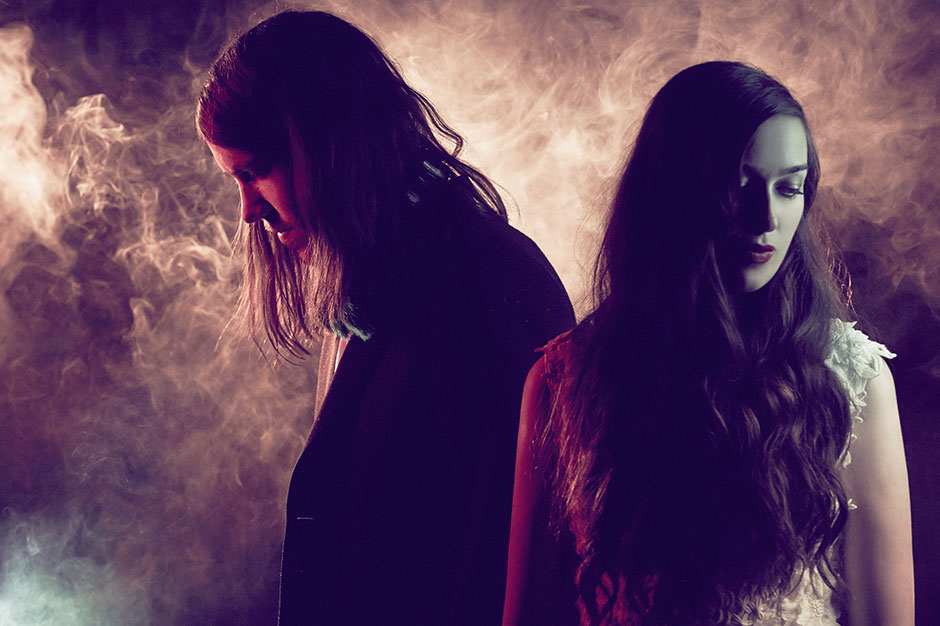Shrouded in an intentional aura of mystery, Cults appeared in March 2010 with their first single, “Go Outside,” a reverb-heavy pop singalong. The song was the work of duo Madeline Follin and Brian Oblivion, who ran with the unexpected success, dropping out of film school and, before long, signing to Columbia Records. A Billboard-charting debut album (2011’s Cults), blog love, TV spots, and lots and lots of touring followed.
Static, the band’s second LP, has, obviously, a far different origin story than its predecessor. For one, the San Diego-via-New York bandmembers are no longer a romantic couple, and as their relationship has changed, so has the music. This is a moody record, interpolating Cults’ innate sense of pop melody inside a newfound manipulation of rhythm and texture. Songs like the pulsing “High Road” evoke movie soundtracks and traffic in layered melancholy, extending beyond any simple Phil Spector/David Lynch signifiers.
We talked over coffee at a café in Manhattan’s East Village about major labels, road-dogging, and what’s next.
Between the Internet-hype success of your original single and now, you’ve become a heavy-touring act. To support the first album, you played something like 300 shows. Are you planning on a similar level of touring this time around?
Madeline Follin: We always say we’re not going to, but then we’ll get an email from a booking agent: “Oh, hey, we have an offer in Brazil,” and okay, we’ll take Brazil. And they’ll be like, “Oh, we have a month in Australia.” We’ll try not to, but we like traveling. We’ll probably end up touring a lot.
Brian Oblivion: The most dramatic was on our first tour, playing a headlining show in Lawrence, Kansas, for literally just the people in the bar — four people and the crazy openers. Then we went back, and played the Grenada, which is a really nice venue there. I think that’s part of the reason we kept touring so much — we were addicted to the growth of it. It was fun to watch, and fun to play.
Given that you’ve toured so extensively, what’s left for a second release cycle in terms of growth?
Oblivion: We’re not the most ambitious band in the world. My dream is to play Madison Square Garden, but I’d be happy with an opening slot. We’re really excited about being able to do full sets.
Follin: For the past 300-however many shows we’ve been playing, we’ve only had one record out. So the venues would book us for hour sets, and we couldn’t do it. We maybe could have learned ten covers and made that happen, but it’s exciting that we get to switch up the set every night and play whatever we want.
Did your touring members work on the record?
Oblivion: I don’t think this record would have got done without [guitarist] Gabe [Rodriguez]. He played a valuable role in mediating between me and Madeline when we were super weird toward each other. But mostly it’s still just the two of us. I couldn’t really work with a third mind. I don’t know how bands do it. Like, five people? All their opinions are valid on everything? It sounds like a nightmare.
How was the dynamic between you two different this time?
Oblivion: Madeline and I had broken up from our relationship, and once we got off tour, we spent two months apart, traveling and doing weird stuff. Then we came right into the studio, and we’re supposed to work together. It was fine, because we’ve always been cool, but it was nice to have that third person there for those moments when you needed to argue about something, and you didn’t want it to spiral into something else.
The new record is very lush, almost like a film score. How was your musical approach different than on the debut?
Oblivion: We were focused on it being and feeling like a live record. So much of the last record was composed with fake drums, fake bass, fake organs. That worked for what we were doing. But this time I wanted to just do it real. A lot of it was about sourcing out a lot of really weird and expensive gear, and trying to have authentic performances and groove. The movie soundtrack thing was a big part of it. We had the album title before we started working on it, and one of the things we’d think about when sequencing songs was channel surfing: This song would be a sci-fi song, this song would be a Western song, this would be a secret agent song, this is a horror song and so on.
Which is the horror song?
Oblivion: “So Far” or “Good Day.” “I Can Hardly Make You Mine” is sci-fi. “Shine a Light” is Italian romance.
How do you plan on reproducing that density of sound live?
Oblivion: Obviously there are a lot of things that we’re playing off samplers. It’s nice that you can recreate the exact sound live, but if you’re not playing them in an interesting way, what’s the point of playing it at all? It could just be off an iPod. So we always try to integrate the sounds that we can’t have with our MPCs and try to actually perform them. It sometimes backfires, but it’s largely a more satisfying way of doing it. I’m not interested in being a band with strings and a tuba guy. A lot of times, the part that’s on a Farfisa, or strings, or a French horn on a record, just the Farfisa is fine live. You work with people’s sensory abilities to try to get the best performance you can.
Do you see the new album as at all similar to the first in terms of style and approach?
Oblivion: I think it’s fundamentally different. We didn’t set out for it to be this way, but finally we sat down with the finished product, and it feels like almost a rebuttal to the first record; it feels like a companion piece. That’s what happens as you grow up. You look back at yourself three years ago and realize, “I was an asshole.” You try to rectify that. That’s a fun way of going about records: thinking back on who you were, navigating to who you are, and trying to be thoughtful.
You’re on Columbia, but make music that clearly isn’t designed for the kind of mass success that other artists on the roster are trying to achieve. For bands that are aiming at that high level, how do you think they plan to get from the ground level to the top? It seems like there’s nowhere in between.
Oblivion: I’ve had that conversation with a lot of musicians — even with Michael [Angelakos] of Passion Pit, who’s arguably almost there. We were saying that radio is this crazy pipe dream. You can do so much to try to get on the radio. We really don’t do very much, but I know people who fly all the way out to L.A., play a free show, fly to Seattle, play a free show, pay their own money to do that, and the label pays them to go to conferences, shake hands — it’s still this seedy business. I remember he said something like, “You know, back in the day, it used to just be payola. I wish it was still that way,” and I was like “I do too! Holy shit, if we could just pay, and get stuff on the radio.” The radio was way better when people were paying to get stuff on there. Now, these Clear Channel assholes decide what’s going to push advertisements and move hot song blocks. It’s just really frustrating. But without that, you can’t really become a super successful artist.
You’ve been in that weird space of being a major-label act at the same time as having more underground Internet hype. That’s not the most usual scenario in the music world.
Oblivion: I like to think that what we get from being on a record label is, number one, smart people. Everyone who works there is really cool and professional, and not druggy party people like so many people in the industry. And we get more money up front, so we get to go into nice studios and futz around for months at a time. I know indie bands that are really successful who can barely afford more than three weeks in a studio. They can’t make music videos, which is a huge thing our label helps us out with. I have a chip on my shoulder. I feel like a lot of smaller indie labels are giving bands really bad deals and robbing them. You see a lot of labels still give a band a $40,000 advance, which seems like a lot of money, but these days, you split all your money with the label. An indie band ends up in a Hyundai commercial and makes 100 grand, and the label is like “Welp, fuck you.” All these bands are trading their cool points for cash, and [the labels are] making out like bandits.
There’s publishing to consider, too.
Oblivion: Exactly. A lot of labels won’t sign you unless you sign a publishing deal, too. It’s become really bleak, because people are so desperate for attention and validation that they’ll just sign it over. It’s like the new ’60s. We had a publishing deal.
Follin: We signed one when we were first starting as a band, because we had no money.
Oblivion: Before our record deal.
Follin: This company asked us to sign a publishing deal, which was probably way less than we should have got. But we needed quick cash, and got out of it.
Oblivion: So we’re free now.
Do you have any collaborations happening these days?
Oblivion: She recently got to work on a track for the new Jim Jarmusch movie. We actually did a track with him — it’s like the coolest thing we’ve ever done.
Follin: That never saw the light of day.
Oblivion: It’ll never come out. The original idea was getting people doing spoken-word tracks, and we’d create a soundtrack. But we got Jim to do one. We got Sasha Grey to do one. We even got Bret Easton Ellis to do one.
Oh, come on.
Oblivion: Yeah. But right when that happened, Loutallica came out. I was like, “You know what? This idea is not happening.” We didn’t want to embarrass anyone involved with comparisons to that. So maybe it’ll come out, in a b-sides-and-rarities record down the line. But that was a really funny project.
Follin: Jim’s was great.
Oblivion: He sounded like an episode of Dragnet.





